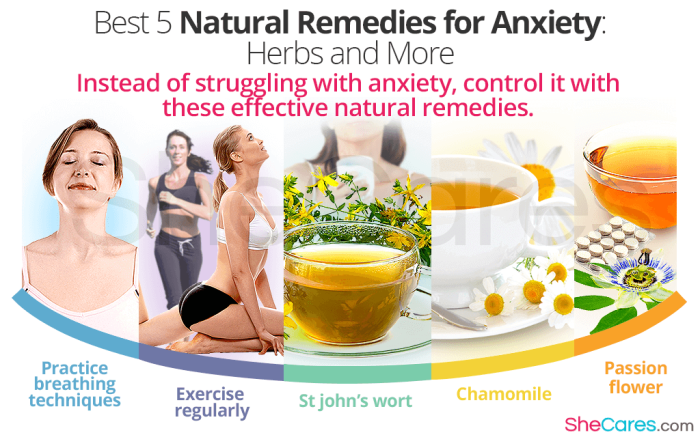Exploring the realm of natural remedies for managing anxiety and stress opens up a world of possibilities for those seeking a holistic approach to wellness. From herbal remedies to mind-body techniques, this guide delves into diverse methods that offer relief and relaxation in natural ways.
Introduction to Natural Remedies
Natural remedies for managing anxiety and stress involve using natural substances or techniques to alleviate symptoms and promote overall well-being. These remedies are becoming increasingly popular as people seek alternatives to traditional medications, often due to concerns about side effects or dependency issues.
Examples of Common Natural Remedies
- Herbal Supplements: Plants like chamomile, lavender, and passionflower are known for their calming properties and are commonly used to reduce anxiety.
- Essential Oils: Aromatherapy with oils like lavender, bergamot, and ylang-ylang can help promote relaxation and reduce stress levels.
- Mindfulness and Meditation: Practices that focus on being present in the moment and calming the mind can be effective in managing anxiety and stress.
- Exercise: Physical activity releases endorphins, which are natural mood lifters, making exercise a great way to reduce stress and anxiety.
- Dietary Changes: Consuming foods rich in omega-3 fatty acids, magnesium, and vitamin B can support mental health and help reduce anxiety symptoms.
Herbal Remedies
Herbal remedies have been utilized for centuries to help manage anxiety and stress naturally. These remedies are derived from plants and herbs that have calming effects on the mind and body.
Popular Herbs for Calming Effects
There are several popular herbs known for their calming effects on anxiety, including:
- Lavender: Lavender is well-known for its soothing properties and can help reduce anxiety and promote relaxation.
- Chamomile: Chamomile is often consumed as a tea and is known for its calming effects on the nervous system.
- Ashwagandha: Ashwagandha is an adaptogenic herb that helps the body cope with stress and anxiety.
- Valerian Root: Valerian root is commonly used as a natural remedy for insomnia and anxiety.
Benefits and Side Effects of Herbal Remedies
While herbal remedies can offer natural relief from anxiety, it is essential to be aware of their benefits and potential side effects:
- Benefits:
- May help reduce anxiety and stress levels.
- Generally have fewer side effects compared to pharmaceutical medications.
- Can be a more holistic approach to managing anxiety.
- Side Effects:
- Some herbs may interact with medications or have allergic reactions in certain individuals.
- Overconsumption of certain herbs may lead to adverse effects.
- It is crucial to consult with a healthcare provider before incorporating herbal remedies into your routine.
Preparing Herbal Remedies at Home
Here are some simple recipes or methods for preparing herbal remedies at home:
- Lavender Tea: Steep dried lavender flowers in hot water for a calming tea.
- Chamomile Tincture: Create a chamomile tincture by soaking dried chamomile flowers in alcohol for a few weeks.
- Ashwagandha Capsules: Fill empty capsules with ashwagandha powder for a convenient way to consume this herb.
- Valerian Root Tea: Brew valerian root in hot water for a soothing tea before bedtime.
Essential Oils
Essential oils are highly concentrated plant extracts that are known for their various therapeutic benefits. When it comes to managing stress and anxiety, essential oils can be a natural and effective solution. These oils can help calm the mind, relax the body, and promote a sense of well-being.
Commonly Used Essential Oils for Relaxation
- Lavender: Lavender oil is well-known for its calming and relaxing properties. It can help reduce stress and promote better sleep.
- Chamomile: Chamomile oil is great for soothing nerves and reducing anxiety. It can also help with insomnia.
- Ylang Ylang: Ylang Ylang oil has a sweet floral scent that can help uplift mood and reduce feelings of stress.
- Bergamot: Bergamot oil is citrusy and refreshing, making it a great choice for reducing anxiety and improving mood.
- Frankincense: Frankincense oil is often used in aromatherapy to promote relaxation and reduce stress and anxiety.
Different Ways to Use Essential Oils for Managing Anxiety
- Aromatherapy:Add a few drops of your chosen essential oil to a diffuser and let the scent fill the room to create a calming atmosphere.
- Topical Application:Dilute the essential oil with a carrier oil and apply it to pulse points, such as wrists and temples, for quick absorption.
- Bath Soak:Add a few drops of essential oil to a warm bath and soak for a relaxing and soothing experience.
- Inhalation:Inhale the scent of the essential oil directly from the bottle or add a few drops to a tissue for on-the-go relaxation.
Mind-Body Techniques

Mind-body techniques play a crucial role in reducing stress and anxiety by promoting relaxation and mindfulness. These practices, such as yoga and meditation, help calm the mind and improve overall well-being.
Yoga
- Yoga involves a combination of physical postures, breathing exercises, and meditation.
- Regular practice of yoga can help reduce stress, anxiety, and improve mood.
- It promotes relaxation, flexibility, and mindfulness, leading to a sense of calm and balance.
Meditation
- Meditation focuses on mindfulness, deep breathing, and awareness of the present moment.
- It can help quiet the mind, reduce racing thoughts, and promote inner peace.
- Regular meditation practice is linked to lower levels of stress and anxiety.
Deep Breathing Exercises
- Deep breathing exercises help activate the body's relaxation response, reducing stress and anxiety.
- By taking slow, deep breaths, you can calm the nervous system and promote a sense of tranquility.
- Incorporate deep breathing exercises into your daily routine, especially during moments of stress or anxiety.
Dietary Changes
When it comes to managing anxiety and stress, dietary changes can play a significant role in promoting relaxation and reducing stress levels.
Foods that Help Reduce Anxiety and Stress
- Eating foods rich in omega-3 fatty acids, such as salmon, walnuts, and chia seeds, can help reduce anxiety and promote brain health.
- Consuming complex carbohydrates like whole grains and vegetables can help stabilize blood sugar levels and improve mood.
- Including foods high in magnesium, such as spinach, almonds, and avocados, can help relax muscles and calm the nervous system.
Impact of Caffeine, Sugar, and Processed Foods
Caffeine, sugar, and processed foods can exacerbate anxiety and stress levels due to their effects on the body.
- Excessive consumption of caffeine can lead to increased heart rate and feelings of restlessness and anxiety.
- High sugar intake can cause fluctuations in blood sugar levels, leading to mood swings and increased feelings of stress.
- Processed foods high in unhealthy fats and artificial additives can negatively impact mental health and contribute to feelings of anxiety.
Meal Ideas and Recipes for Relaxation
Creating balanced meals with a combination of nutrient-dense foods can help promote relaxation and reduce stress.
- Try a quinoa salad with mixed vegetables and grilled chicken for a well-rounded meal rich in protein and fiber.
- Prepare a calming chamomile tea with honey and lemon as a soothing beverage to help unwind in the evening.
- Opt for a homemade vegetable stir-fry with tofu and brown rice for a nutritious and comforting dinner option.
Lifestyle Adjustments
When it comes to managing anxiety, lifestyle adjustments play a crucial role in promoting overall well-being. Adequate sleep, regular physical activity, creating a calming environment, and effective time management are key factors in reducing stress levels.
Importance of Adequate Sleep and Regular Physical Activity
Getting enough sleep and engaging in regular physical activity are essential for managing anxiety. Lack of sleep can exacerbate anxiety symptoms, while exercise releases endorphins that help improve mood and reduce stress.
- Aim for 7-9 hours of quality sleep each night.
- Incorporate at least 30 minutes of physical activity into your daily routine, such as walking, yoga, or dancing.
- Establish a bedtime routine and create a comfortable sleep environment to promote better sleep.
Creating a Calming Environment
Creating a calming environment at home or work can significantly impact your mental well-being. A serene space can help reduce anxiety levels and promote relaxation.
- Declutter your surroundings to minimize distractions and create a sense of order.
- Use soothing colors, scents, and lighting to create a peaceful atmosphere.
- Incorporate elements of nature, such as plants or natural light, to connect with the outdoors.
Managing Time and Setting Boundaries
Effective time management and setting boundaries are essential for reducing stress levels and preventing burnout. Learning to prioritize tasks and establish boundaries can help create a healthier work-life balance.
- Use a planner or digital calendar to organize your tasks and schedule regular breaks.
- Delegate responsibilities when possible and learn to say no to avoid overcommitting.
- Set aside time for self-care activities, hobbies, and relaxation to recharge and unwind.
Concluding Remarks
In conclusion, embracing natural remedies for managing anxiety and stress not only nurtures the body but also the mind and spirit. By incorporating these practices into daily life, one can pave the path towards a more balanced and harmonious existence.
Quick FAQs
Can natural remedies completely replace traditional medications for anxiety?
While natural remedies can be effective for some individuals, it's essential to consult with a healthcare provider to determine the best course of treatment.
Are there any specific dietary restrictions to follow when using natural remedies for anxiety?
It's advisable to limit the intake of caffeine, sugar, and processed foods as they can exacerbate anxiety symptoms.
How long does it typically take to see results from using natural remedies for anxiety and stress?
The effectiveness of natural remedies varies from person to person, but consistency in usage is key to experiencing benefits over time.



